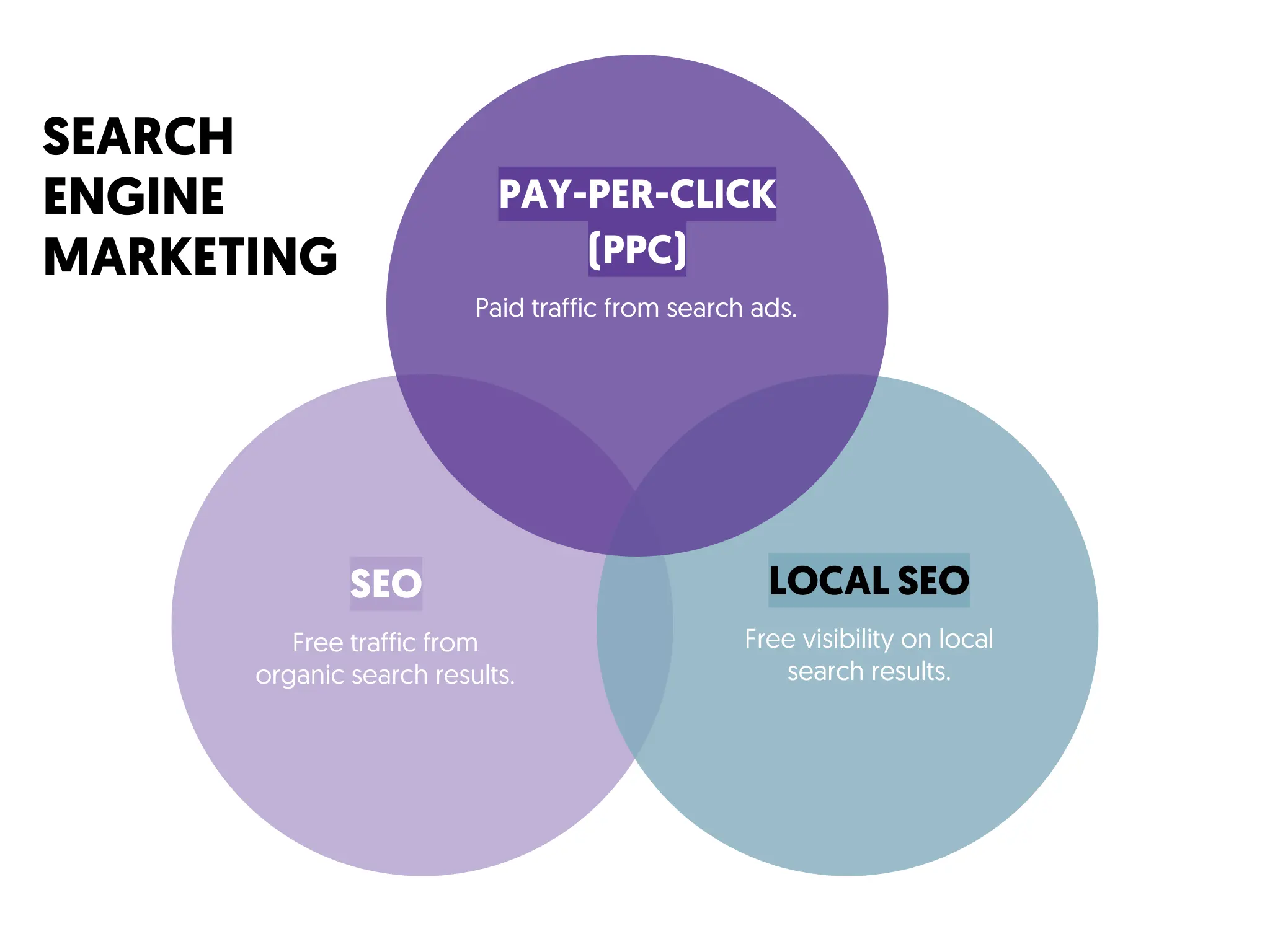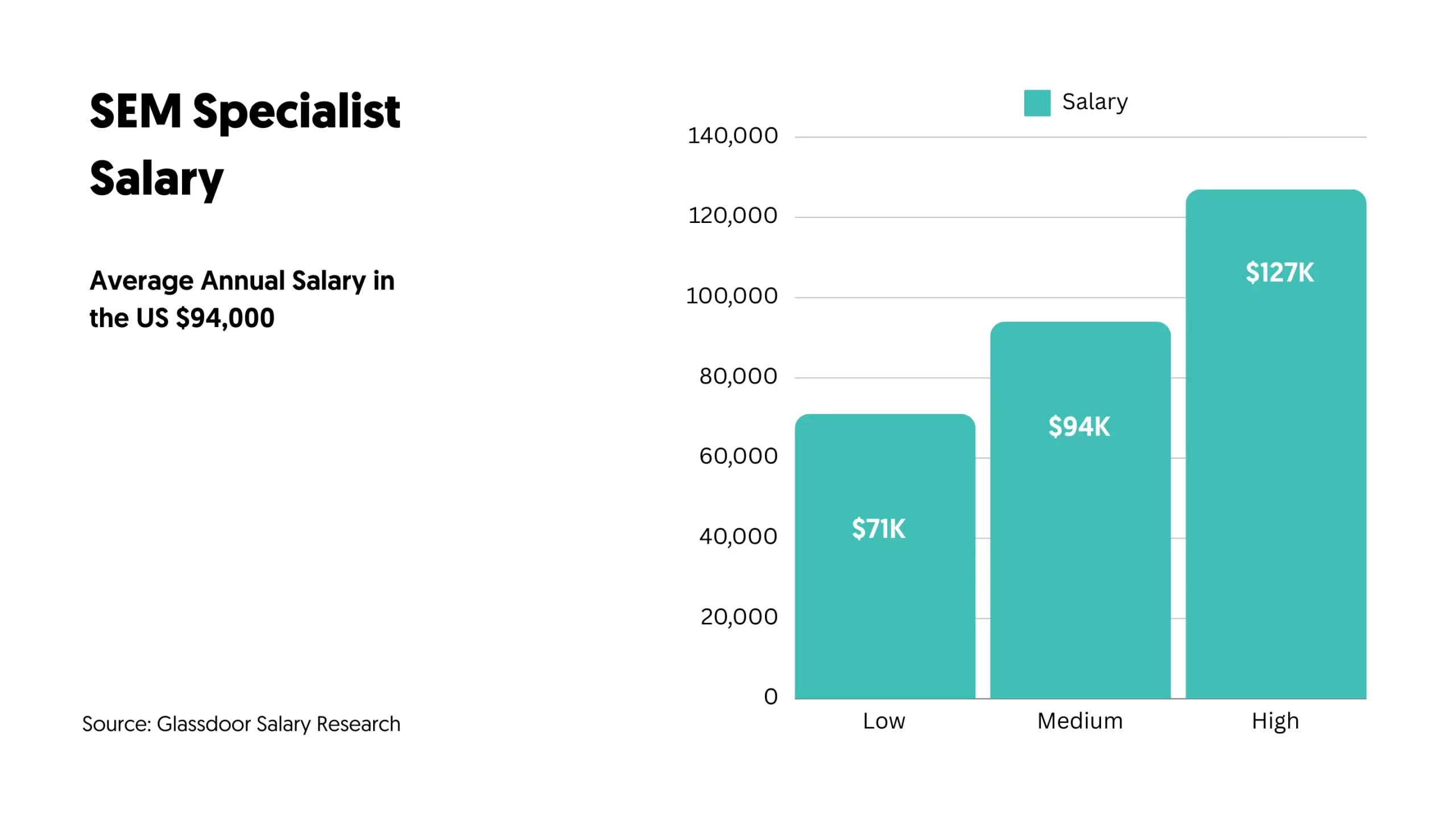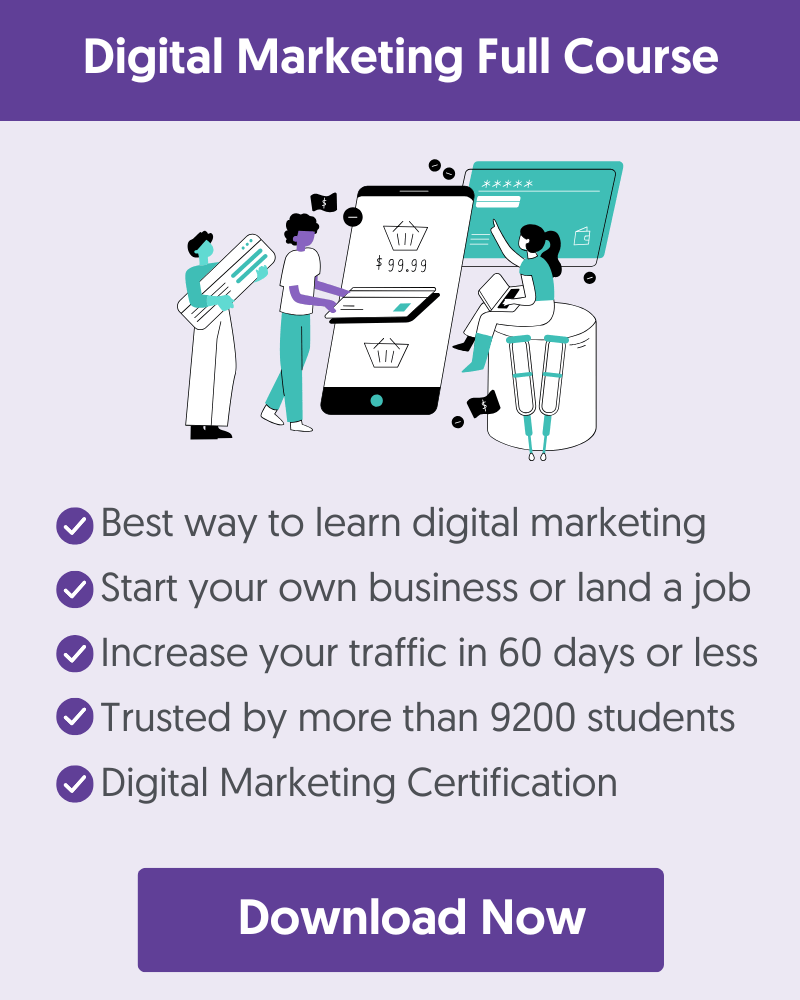One of the digital marketing roles that has gained ground in the last few years is that of an SEM specialist. With the introduction of AI tools in marketing, the need for experts to handle search engine marketing tasks has become very important for businesses of all sizes.
In this guide, we'll examine what an SEM specialist does and what skills and qualifications are needed to become an SEM specialist without prior experience.
What is an SEM specialist?
An SEM specialist is responsible for handling a business's organic and paid campaigns to increase traffic and exposure in search engines like Google. They use techniques like SEO and PPC advertising to promote products or services to the right audience and get more leads and sales from search engines.
SEM Specialists need to be experts in Search Engine Marketing (SEM), which covers the three major ways you can get traffic from search engines:
- Ranking high in the SERPS organically (SEO)
- Using Paid Search Ads (PPC)
- Get visibility in the local search results (including Google Maps)

What Does an SEM Specialist Do? (Day-To-Day)
The daily activities of an SEM Specialist include the following tasks:
1. Analyzing the SERPs
Before doing anything else, a Search Engine Marketing Specialist needs to analyze the behavior of the Search Engine Result Pages (SERPs). Google (and other search engines) make hundreds of changes yearly to how they present the search results, affecting all types of SEM campaigns.
They should know what search features are available (like featured snippets, rich snippets, and local packs) and how to optimize their content and ads to appear in the top positions.
2. Keyword Research
Another daily activity of an SEM specialist is performing keyword research to support the needs of organic and paid campaigns. This includes researching competitors to find which keywords they use in their paid ads and comparing the organic performance of websites to spot keyword opportunities for SEO.
SEM specialists who want to differentiate their campaigns from the rest also look for trending topics and new keywords that are not yet popular and try to get the audience's attention before it gets crowded.
3. Managing Organic Campaigns
SEO is an important part of SEM, and SEM Specialists spend much of their time on it. With SEO, you can get free traffic from search engines, generating higher ROI than other marketing channels.
Some typical SEO tasks an SEM Specialist handles include technical SEO, on-page SEO, and Off-Page SEO.
4. Managing Paid Search Campaigns
PPC marketing has many types and includes different campaigns targeting audiences through search, social networks, and other websites.
SEM specialists work with a particular type of campaign targeting search engine users. Platforms like Google Ads and Bing Ads have tools for creating campaigns to show your ads in the SERPs or Google Maps.
They need to know how to set up campaigns, create compelling ad copies, and optimize them to get conversions at the lowest possible cost.
5. Report And Present Findings to Stakeholders
SEM Specialists may work in a digital marketing agency, be part of a company's marketing team, or work directly with clients as freelancers. In all cases, they must track and measure their campaign performance and create reports to present their findings to stakeholders.
This involves using tools like Google Analytics, Google Search Console, Google Ads, Google Looker Studio, Semrush, and others to gather data, analyze it, and make recommendations on budgeting and optimization.
Required Skills And Qualifications
A good SEM Specialist must have certain skills and qualifications to perform all the activities successfully. Let's examine these in more detail.
Educational Qualifications
A bachelor's degree in digital marketing or marketing and a couple of years of experience in SEO and PPC are usually required to get a job as an SEM specialist.
Most companies will accept a professional qualification, such as a Google Ads Certification or Digital Marketing Certification if you don't have a degree.
From our experience hiring SEM Specialists, practical experience, a proven record of successful case studies, and skills are more important than qualifications for positions like this.
Required Skills
The skills required to work as an SEM Specialist are related to the job responsibilities (as explained above). The most common are:
1. Search Engine Optimization (SEO): Becoming an SEO expert requires building skills related to keyword research, on-page optimization techniques, and how search engines work. It’s also essential to keep up with the latest Google algorithm updates and how they affect search rankings.
2. Google Ads And Other PPC Skills: Working with PPC requires setting up, managing, and optimizing ad campaigns across platforms like Google Ads. This includes targeting keywords, crafting compelling ad copy, and analyzing performance data to refine strategies.
3. CRO (Conversion Rate Optimization): Effective CRO involves understanding user behavior to improve website conversions. Skills in A/B testing, user experience (UX) analysis, and using tools like heatmaps and session recordings are crucial.
4. Content Marketing Skills: This skill set requires creating engaging content tailored to the audience's interests and needs, aligned with SEO best practices. It also involves mastering content distribution across various channels to maximize reach and engagement.
5. Digital Analytics: SEM Specialists must learn to use digital marketing analytics tools like Google Analytics to track website performance, analyze data, and make informed decisions. Understanding metrics such as bounce rate, traffic sources, and conversion rate is essential.
6. Communication Skills: Clear, concise communication, both in writing and verbally, is vital to explain campaign strategies, results, and recommendations to team members, clients, and stakeholders.
7. Project Management and Organizational Skills: Strong project management skills are required to organize multiple digital marketing campaigns, meet deadlines, and coordinate with other team members. This includes prioritizing tasks, managing timelines, and maintaining budget constraints.
Salary And Job Opportunities
According to recent research, the average salary of an SEM specialist in the United States is $94,000 yearly. Entry-level jobs pay around $71,000 annually, and experienced SEM specialists may earn up to $127,000 annually with bonuses.

Searching job portals like Glassdoor, Zip Recruiter, or Indeed, you'll find hundreds of job openings for SEM Specialists. There are job opportunities for remote work, part-time or full-time. Companies searching for SEM Specialists may combine the position with the following job roles:
- SEO Specialist
- PPC Specialist
- Digital Marketing Specialist
- Paid Media Specialist
- Digital Strategy Specialist
5 Steps To Become a SEM Specialist
To increase your chances of getting a job with a good salary, you must build diverse skills to cover both the organic part (SEO) and the Pay-Per-Click (PPC) aspect of SEM. As mentioned above, practical experience is much more important than qualifications, and this is what you should focus on.
Follow these 5 steps to become a successful SEM Specialist:
1. Start Learning SEO and PPC
If you're a beginner, your first step is learning SEO and PPC. Fortunately, there are many free resources you can use to get started. Engaging in these practices before committing to a degree or certification will allow you to evaluate the work needed and whether this is a good career for you.
For this task, you can use our resource guides (they are 100% free):
2. Get a Relevant Degree or Certification
When you decide that this is something you want to do professionally, the next step is to acquire the necessary educational qualifications. If going after a digital marketing degree is not a choice because of the cost and time needed, a good alternative is to get a professional certification.
There are many benefits to getting certified. In addition to having a credential to apply for jobs, you'll also receive structured training, which is the fastest way to master a skill like SEM.
Many digital marketing courses from reputable organizations can teach you the basics and advanced SEM concepts. The time investment is a couple of months, and the cost is affordable.
When choosing a course, ensure that it offers a recognizable certificate and that the syllabus covers SEO, PPC, Google Ads, Facebook Ads, and Google Analytics. These are the essential topics that you must master to start working as a junior SEM specialist.
3. Gain Practical Experience
After getting your degree or certification, the next step is the most critical. It involves getting practical experience with SEO and PPC campaigns. There are a couple of proven ways to do that:
Apply for entry-level jobs - Many companies hire entry-level SEM specialists to help them with specific tasks. This is a great opportunity for beginners to work in the field and gain real-life campaign experience. At this stage, don't worry about the salary but the type of work and company to work with. Your goal is to learn from experts and gain experience you can capitalize on later by applying for higher-paying jobs.
Work on your own projects - Another way to gain practical experience is to set up a website and start doing SEO. For me, this is the best way to learn how SEO works. It will take you more time, but it will help you build solid foundations for the future.
Only when you try to rank a website on Google will you understand the difficulties and challenges involved. And if you manage to get good results, it will be a great turning point in your career.
To practice with PPC campaigns, offer to do some work for a low fee (or even free) to friends with websites suitable for PPC advertising.
4. Build Your Portoflio
Record any projects you do as part of your degree or course training, and create a portfolio page. This is super important when applying for jobs. Having a portfolio helps potential employers assess your practical skills and plays a critical role in the hiring process.
In your portfolio, include any articles you wrote on SEM, your work on your own websites, and anything else that can differentiate you from other candidates.
5. Prepare For Interviews And Apply For Jobs
The last step is to prepare for interviews and apply for SEM-related jobs. The simplest way to prepare for an interview is to be ready to answer questions related to managing SEO and PPC campaigns and about the projects listed in your portfolio.
When hiring, we tend to ask candidates practical questions to help us understand how they approach tasks related to campaign management and optimization tactics. We also assess their verbal communication skills, which are critical for building high-performance teams.




